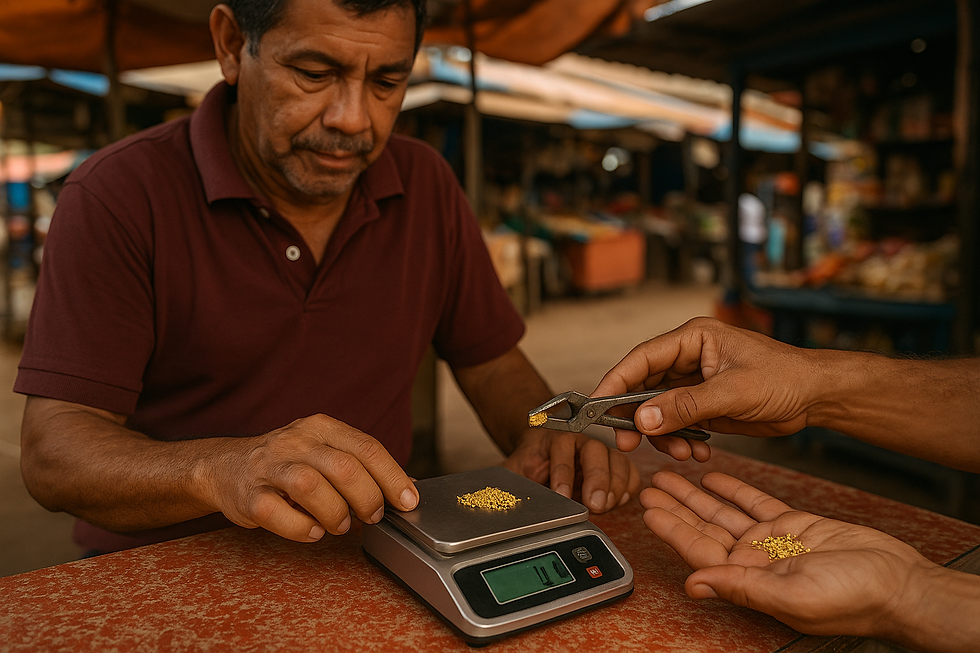Venezuela: Shaving Nuggets for Haircuts
- Ian Chard

- Apr 30, 2025
- 4 min read
Updated: May 9, 2025
In Venezuela, the collapse of the bolívar under hyperinflation, reaching over ten million percent by 2019, triggered a remarkable grassroots monetary revolution.
Gold, an ancient store of value, resurfaced dramatically in everyday life, especially within the mineral-rich jungle towns of Bolívar state. Here, in the heart of the country’s gold mining belt, nuggets and flakes replaced banknotes and digital transfers, re-establishing a practical and stable medium of exchange.

In Part 3 of our series, we explore Venezuela’s informal gold economy in detail, looking at personal stories, the rise of gold-based barter markets, the illicit trade across borders, and the government's complex relationship with grassroots gold trading.
Flakes for Food: Venezuela’s Gold Economy in Action
As Venezuela’s bolívar crumbled, gold quietly took its place, not in vaults, but on street corners. In towns like Tumeremo and El Callao, gold became the standard unit of exchange. Prices in shops, barbershops, and hotels weren’t just referenced in grams where they were weighed out on digital scales at the counter.
A Bloomberg despatch captured the new normal.
A hotel night cost half a gram.
Lunch for two? A quarter gram.
A haircut? One-eighth.
Shoppers would shave flakes off nuggets or chains, adjusting by the fraction to land the total just right. Transactions didn’t rely on trust, they relied on precision.
“You can pay for everything with gold,” said Jorge Peña, a local and as reported in the financial post. No drama in his tone, just explaining the matter of fact.
This informal gold economy thrived because it offered what the national currency couldn’t: stability, measurability, and trust.
When the bolívar lost meaning, gold quietly resumed its ancient role. This time not as investment, but as bread-and-butter tender.
Digital Scales and Trust: A Modern Ancient Economy
In Tumeremo’s crowded markets and roadside stalls, digital scales held the authority of cash registers. But what they weighed wasn’t coin or currency it was raw, unrefined gold, pulled from nearby jungle rivers and mines.
Miners brought back rough nuggets, not bullion. These were shaved into flakes, sometimes with knives, sometimes with pliers for daily use. Even a coffee could cost as little as 0.1 grams. Trade became tactile, precise, and oddly intimate.
There was no central bank to verify purity. Instead, trust resurfaced at the human level.

Shopkeepers learned to read gold by eye and feel. Customers gauged fairness not by brand, but by habit, reputation, and the shimmer of the metal.
Disputes bred solutions. Informal arbiters emerged, these men and women whose judgment on purity and weight became gospel in local circles. Over time, a grassroots economy formed, steady and self-regulated.
Not by decree, but by necessity, a kind of improvised gold standard took hold proof that even in collapse, commerce finds a way.
Smuggling Routes: From the Jungles to Dubai
Gold didn’t stop at Venezuela’s borders. As it replaced the bolívar in local markets, it also became the fuel for an international smuggling machine.
Porous frontiers with Colombia turned into conduits. Criminal syndicates, some tied to armed groups like the ELN and ex-FARC tightened their grip on mining zones, moving gold out through boats, planes, trucks, and human couriers known as mulas.
Refugees, miners, and opportunists joined the flow, each carrying flakes or nuggets toward escape routes.
Once abroad (in Colombia, Brazil, Guyana, and especially Dubai) the gold was scrubbed clean. An Al Jazeera investigation laid bare the machinery: suitcases packed with raw metal crossed borders undetected, landed in Dubai, and were refined into legitimacy. Once stamped, the gold entered global circulation.

The profits traced back in multiple directions. Some funded basic survival for displaced families. Others, more discreetly, bolstered Nicolás Maduro’s regime proof that a collapsing economy can still produce valuable exports, if not through policy, then through the paths carved by desperation.
Grassroots Survival vs. Regime Exploitation
Unlike Zimbabwe’s overt repression of informal gold trade, Venezuela’s regime adopted a more ambivalent yet strategically opportunistic approach.
Grassroots use of gold was largely tolerated, especially in remote towns where enforcement was costly and logistically impractical.
Instead, state focus turned upstream: controlling the mining and export sectors through initiatives like the Arco Minero del Orinoco.
Officially a regulatory effort, it often functioned as a conduit for collusion between government actors, armed groups, and well-placed allies.
At the geopolitical level, the regime turned gold into a backchannel currency.
Central bank reserves were discreetly moved through Turkey, Dubai, and other hubs, allowing Nicolás Maduro’s government to sidestep sanctions and secure hard currency.
In this dual economy, gold played a paradoxical role: at once a survival tool for everyday citizens and a strategic lever for the state’s survival.
Lessons from Venezuela’s Golden Crisis
Venezuela’s collapse revealed gold in its rawest form not as investment, but as lifeline.
It became both a local currency improvised out of necessity and a geopolitical asset wielded by the state.
In that dual role lies a stark lesson: when institutions fail, gold remains legible trusted, transferable, and real.
The grassroots revival of gold-based trade built on community trust, tangible value, and improvised systems speaks to the resilience of commodity-backed exchange when fiat loses meaning.
Next, we turn to Argentina, where gold took on a quieter role: not circulating through markets, but quietly stashed in drawers and safes, guarding families against the erosion of savings and trust alike.
The Full Series
Hyperlinks to be provided once research and blogs are live.
When fiat fails, gold steps in.
Gold panning, barter, and the collapse of trust.
Part 3: Venezuela — Shaving Nuggets for Haircuts
Flakes for food, jungle gold economies.
Family gold becomes financial lifeline.
Part 5: Across Borders — Gold’s Silent Migration
Smugglers, migrants, and the gold trail.
Part 6: Governments, Gold, and Control
Repression, co-option, or reluctant acceptance.
Part 7: Lessons for Free Markets and Investors
Hard money, soft power, and survival signals.
♻️ If you found this analysis valuable, please share!
This article was written by our team, leveraging AI to enhance our research and analysis capabilities while maintaining human expertise and market insight at the core of our process.
Currently in closed beta - click here to JOIN THE WAITLIST



Comments